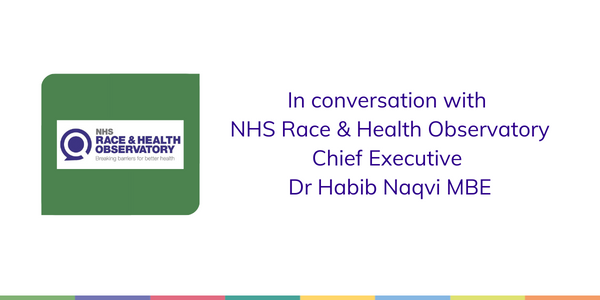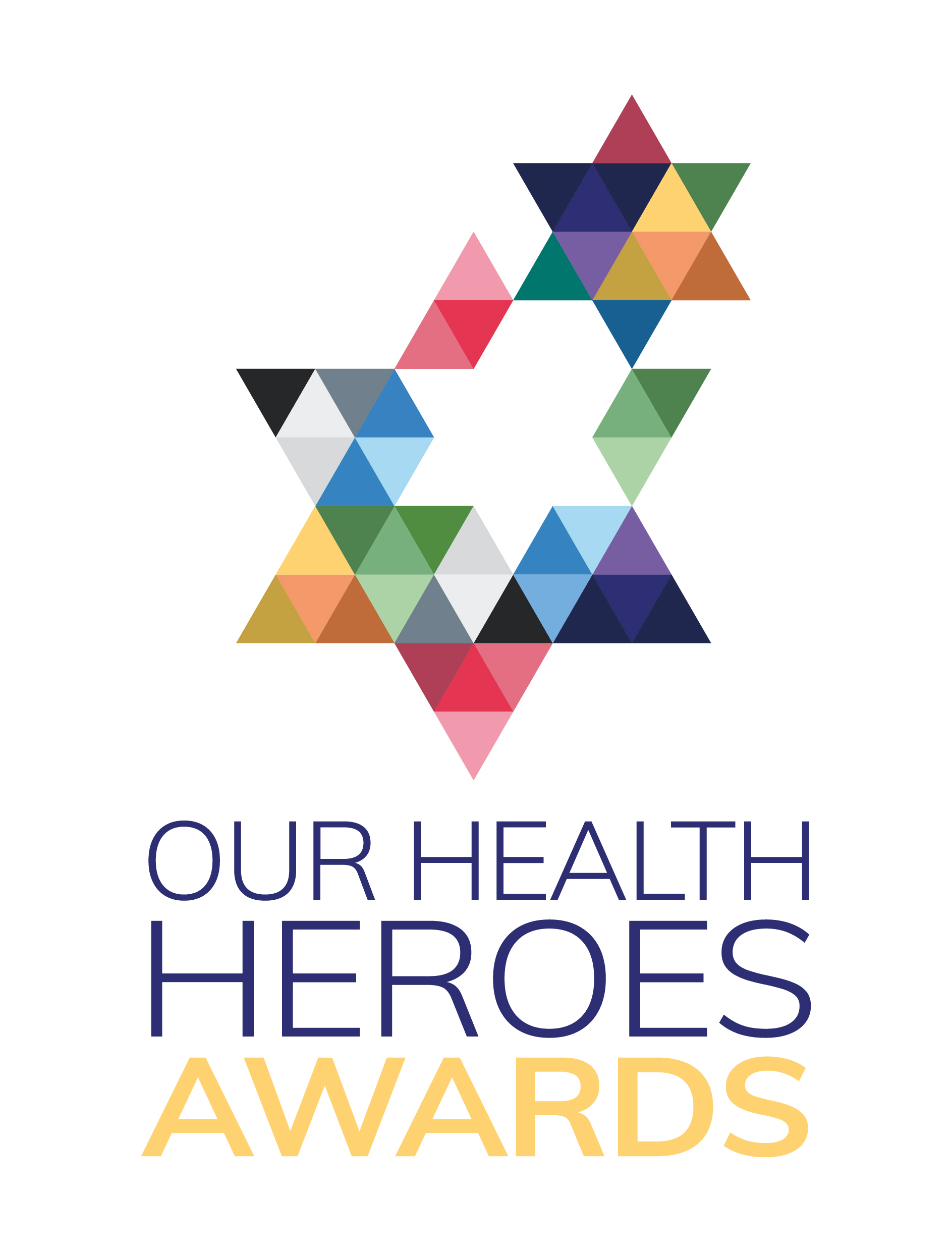
| 9 May 2023
Dr Habib Naqvi MBE is the Chief Executive of NHS Race & Health Observatory – an independent expert body, established by the NHS to examine the health inequalities experienced by Black and minority ethnic communities in England.
National Health Executive recently caught up with Habib to learn more about the work of NHS Race & Health Observatory and why they are supporting the Equality, Diversity and Inclusion award at the Our Health Heroes Awards, delivered by Skills for Health.
Having been established in April 2021, NHS Race & Health Observatory is a relatively new body within the NHS that some readers might not yet be familiar with. What is the organisation’s origin story and how would you describe your main purpose and objectives?
The NHS Race and Health Observatory is an independent body hosted by the NHS Confederation and supported by NHS England.
The Observatory was first publicly spoken about in early 2020, after years of planning. The weight of evidence pointing to ethnic health inequalities had become so great that inaction was no longer an option.
The leadership of the NHS at the time saw that there was a dire need for a new voice in the system, an independent voice that could cut through the politics, expose the impacts and causes of racial inequity in our health and care system, and provide practical evidence-based solutions.
The Observatory was established at an extraordinary time, one year into a pandemic that has changed the world. And although the Observatory was conceived of before the pandemic struck, the disproportionate impact of COVID-19 on Black, Asian and ethnic minority communities in this country has firmly and repeatedly re-established the case for the existence of such a body.
The Observatory exists to do three things: to produce new evidence around ethnic health inequalities in the UK; to synthesise and mobilise this and other evidence through practical recommendations; and to meaningfully support the NHS and other public bodies to deliver genuine and irreversible change.
The Observatory has a total of 16 board members, including Marie Gabriel CBE as Chair, and myself as the Chief Executive.
The call to form the Observatory was cited in the February 2020 special edition of the British Medical Journal entitled Racism in medicine.
On the two-year anniversary of the launch of NHS Race & Health Observatory, how would you sum up the last 24 months?
With the onset of the pandemic, the last period has been extremely busy. We have been establishing the organisation, its architecture and guiding principles as well as firming-up on key workstreams.
The Observatory has five workstreams:
- Improving health and care; focusing on maternal and neonatal health, sickle cell and mental health.
- Empowering vulnerable communities; focusing on COVID related inequalities, and sickle cell disease.
- Innovating for all; focusing on digital health, ethnicity data, genomics and precision medicine.
- Creating equitable environments; focusing on diversifying research and clinical trials, supporting health care leaders in reducing ethnic health inequalities.
- Collaborating globally; focusing on engagement with stakeholders and communities, and working with global partners to identify and share common solutions to common challenges.
Each workstream is supported by an advisory group which consist of clinicians, academics, subject matter experts and leaders in the respective fields, as well as an overarching academic reference group.
We have established over 15 distinct programmes across the workstreams and are now also turning our attention to implementation support.
Though many of these research pieces are longitudinal and will therefore take some months before publication, there is already evidence of the immediate impact of investing in the Observatory. The recommendations in its first publication, on racial bias in pulse oximetry, led to the following actions by key bodies:
- The NHS and Medicines and Healthcare products Regulatory Agency (MHRA) updated their guidance to highlight the potential for inaccurate readings.
- The Secretary of State for Health and Care has launched an independent review into equity in medical devices.
- The National Institute for Health Research (NIHR) put out a call for new studies looking at the potential diagnostic inaccuracy of pulse oximeters. This led to almost £600,000 of funding being awarded to further research on this topic.
At present, we are developing an interactive digital platform that will host data related to our five priority areas, current policies, publications and examples of good practice. This will help the system to drive improvements in the priority areas through providing data, insights and actions that can be taken to close the gap in ethnic and racial health inequalities where they exist.
Over the past year we have undertaken work that has sought to plug gaps in existing knowledge, or to create evidence granular enough to promote practical actions.
The below list outlines just some of our work:
- A review of ethnicity coding in English health service datasets.
- A focused review supporting named leads for health inequalities on NHS boards.
- A rapid evidence review looking at ethnic health inequalities across five key priority areas for the Observatory.
- A policy review of the Improving Access to Psychological Therapies (IAPT) programme.
- A mapping exercise of existing policy interventions to tackle ethnic health inequalities in maternity and neonatal health.
- A review of neonatal assessment and practice in Black and Asian new-borns.
- A review of NHS-managed national patient and public mobile apps.
- A study to explore the impacts of Long-COVID on UK healthcare workers.
- A study to identify best practice in mental health care for Gypsy, Roma, and Traveller communities.
- A review into factors that contribute towards inequalities in health outcomes faced by people with a learning disability from a minority ethnic community.
- A review into ethnic health inequalities in precision medicine and the future of healthcare
- A review into ethnic health inequalities in the genetic testing and diagnosis of familial hypercholesterolemia.
In addition, we have been working in close partnership with other organisations such as the National Institute for Healthcare Research (NIHR), Macmillan, the Nuffield Trust, the King’s Fund, and the London School of Hygiene and Tropical Medicine to maximise the impact of our research funding, and to influence the priorities of larger funders. Nowhere is this better evidenced than in the recently NIHR-funded project – a study within a trial to determine the effect of skin tone on the diagnostic accuracy of pulse oximeters – due to produce findings in September 2023.
As we will continue to look ahead, we are increasingly focusing our attention on implementation support that can be provided to healthcare systems and organisations across the country.
We’re interested to learn more about your career background and how this led you to such an important role at this stage in your career.
I joined the NHS in 2001, working in Avon Health Authority where I was responsible for managing large research programmes in the South West of England. I spent a number of years working at the Department of Health and Social Care where I led national equality and diversity policy, including on the health sector’s response to the UK government’s review of the Public Sector Equality Duty.
In 2013, I joined NHS England. I was responsible for the development and implementation of innovative national health equity programmes for the NHS workforce, patients and communities. I was awarded an MBE in the 2019 Queen’s Birthday Honours for services to equality and diversity in the NHS.
My role also ensures a lot of speaking engagements with a broad range of audiences; this entails lots of engagements across the country speaking and writing on matters relating to health equity. I have also given evidence to the House of Commons Health and Social Care Committee.
My interest and commitment to the area of equity led me to become a trustee of the Mary Seacole Trust; I’m also a board member of Somerset County Cricket Club with the portfolio of equity and inclusion.
The pandemic brought race and health inequalities into sharp focus. What needs to happen now to ensure that history doesn’t repeat itself?
Due to the independence of the Observatory, we are in a position to add value and provide an unbiased view on ethnic and racial health equality in the health system and, critically, we are seen as a genuinely impartial voice.
There are many key actions that need to happen going forward, these all involve multiple stakeholders including the Government, local councils, and health and care providers ensuring there is targeted engagement programmes built to improve levels of trust with diverse communities. This in particular has been a concerning issue since the start of the pandemic with stark disparities seen with the initial low vaccine uptake.
To increase awareness around national public health campaigns, including vaccines and preventative serious health conditions, information and engagement methods need to be culturally sensitive and tailored to reach the right audience across inclusive formats, languages and engagement platforms. We know that a blanket ‘one size fits all’ approach is not acceptable when it comes to raising awareness and providing information about killer diseases and serious health conditions to our diverse communities.
NHS Race & Health Observatory is a key supporter of the Skills for Health Our Health Heroes Equality, Diversity and Inclusion award. Why do you think it is important to get behind it?
We are thrilled to support this years’ Our Health Heroes Awards, particularly with the introduction of the new and vital ‘Equality, Diversity and Inclusion Champion’ award category.
As an organisation vested in health and care for patients and NHS staff, we need to ensure that society recognises the excellent efforts that teams and individuals are making every day to ensure workplaces are inclusive and committed to the delivery of equitable healthcare for all. Not only does this benefit the healthcare workforce, but it also has a positive impact on patient safety and outcomes.
It is important that we recognise the hard work that is constantly carried out behind the scenes, work that is not always visible to the lay public.
What can you tell us about the future of NHS Race & Health Observatory, and, more broadly about the future of healthcare in the UK?
We find ourselves at a significant point in history for our health service. When we look back at this time in years to come, we hope it will be seen as the moment when the nation woke up to the scale of inequality embedded in the delivery and experience of healthcare, a moment when we decided the future would be different. The work is just beginning. Our mission at the Observatory is to tackle, head-on, ethnic and racial inequity in the health and care system. It will take time, but the tide is starting to turn.

NHS Race & Health Observatory is a supporter of the Equality, Diversity and Inclusion award at the 2023 Our Health Heroes Awards, delivered by Skills for Health. Find out more.
About Skills for Health
Skills for Health is a not-for-profit organisation committed to the development of an improved and sustainable healthcare workforce across the UK. Established in 2002 as the Sector Skills Council for Health, they are the trusted provider of rostering solutions, eLearning, skills development, research, apprenticeship support, and national standards and frameworks for NHS and private healthcare organisations.
About NHS Race & Health Observatory
NHS Race & Health Observatory is an independent expert body, established by the NHS to examine the health inequalities experienced by Black and minority ethnic communities in England. They work as proactive investigators by actioning evidence and insight, providing evidence-based health policy recommendations, and facilitating long-term transformational change across health and care.
